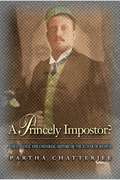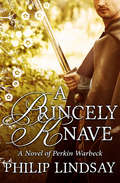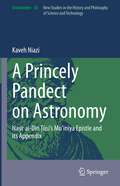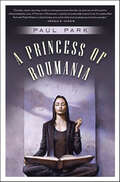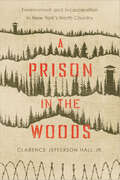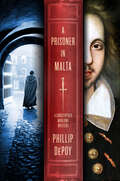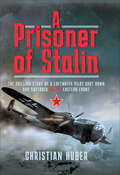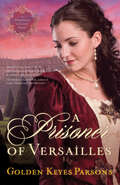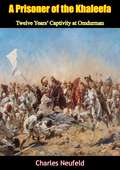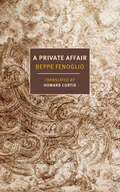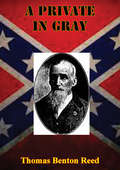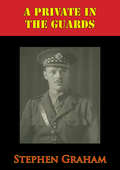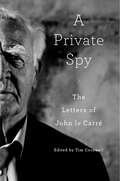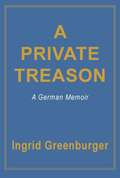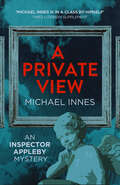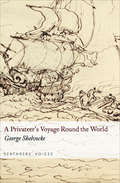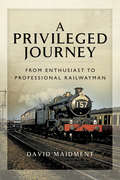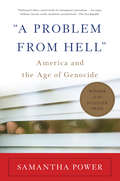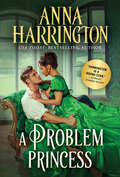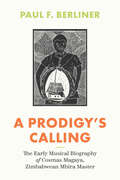- Table View
- List View
A Princely Impostor?: The Strange and Universal History of the Kumar of Bhawal
by Partha ChatterjeeIn 1921 a traveling religious man appeared in eastern British Bengal. Soon residents began to identify this half-naked and ash-smeared sannyasi as none other than the Second Kumar of Bhawal--a man believed to have died twelve years earlier, at the age of twenty-six. So began one of the most extraordinary legal cases in Indian history. The case would rivet popular attention for several decades as it unwound in courts from Dhaka and Calcutta to London. This narrative history tells an incredible story replete with courtroom drama, sexual debauchery, family intrigue, and squandered wealth. With a novelist's eye for interesting detail, Partha Chatterjee sifts through evidence found in official archives, popular songs, and backstreet Bangladeshi bookshops. He evaluates the case of the man claiming, with the support of legions of tenants and relatives, to be the long-lost Kumar. And he considers the position of the sannyasi's detractors, including the colonial government and the Kumar's young widow, who resolutely refused to meet the man she denounced as an impostor. Along the way, Chatterjee introduces us to a fascinating range of human character, gleans insights into the nature of human identity, and examines the relation between scientific evidence, legal truth, and cultural practice. The story he tells unfolds alongside decades of Indian history. Its plot is shaped by changing gender and class relations and punctuated by critical historical events, including the onset of World War II, the Bengal famine of 1943, and the Great Calcutta Killings. And by identifying the earliest erosion of colonialism and the growth of nationalist thinking within the organs of colonial power, Chatterjee also gives us a secret history of Indian nationalism.
A Princely Knave: A Novel of Perkin Warbeck
by Philip LindsayA historical novel inspired by the notorious pretender to the English throne who risked all to be known as Richard Plantagenet. Was Perkin Warbeck, as he claimed, Richard of York, son of King Edward IV, and the rightful heir to the throne won by Henry VII on Bosworth Field? Or was he simply another unscrupulous adventurer who reveled in the threat of rebellion, played for high stakes, and lost? This riveting novel explores one of the most fascinating personalities in English history, describing Perkin Warbeck’s futile attempt to rouse the West Country against the king and his inevitable fate, as well as the tragic story of his wife, Lady Katherine Gordon—who, at the same time in love with and half-despising her husband, risked her freedom for him and found herself drawn remorselessly into the grim drama.
A Princely Pandect on Astronomy: Naṣīr al-Dīn Ṭūsī's Muʿīnīya Epistle and its Appendix (Archimedes #58)
by Kaveh NiaziThis book presents an English-language translation of Risālā-yi Muʿīnīya, or the Muʿīnīya Epistle. Risālā-yi Muʿīnīya is one of the earliest known works of Naṣīr al-Dīn Ṭūsī (1201–1274), an intellectual luminary of the 13th century CE. The work is notable for the choice of Ṭūsī’s native Persian as the language of the text. In addition, Ṭūsī organized his volume into a four-part structure, which went on to become a popular template for the Islamic astronomers who succeeded him. This book helped ensure the patronage of Ṭūsī's courtly patrons during his decades-long stay with the Ismaʿīlīs, as well as the continuation of his remarkable career under the first Ilkhanid rulers of Persia. This translation helps make this notable treatise accessible to English language readers. It is among a handful of English translations of major astronomical works dealing with hay’a/cosmography in the Islamic world. Subsequently Ṭūsī was to pen his own commentary on the work (the Ḥall-i Mushkilāt-i Muʿīnīya, or A solution to the difficulties of the Muʿīnīya) and he used this occasion to discuss his celebrated mathematical formulation “the Ṭūsī Couple” (a concept that he merely hinted at in the Risālā-yi Muʿīnīya).
A Princess by Christmas: A Historical Romance (A Royal Wedding #3)
by Julia LondonShe’s discovered his secret.Now the trouble really begins…After three years of mourning—and turning her dear deceased husband’s gazette into the ton’s sauciest source of fashion and gossip—Hollis Honeycutt feels her life has been strangely bereft of late… Her sister is living abroad, and her best friend moved to the country. What must a young widow of rank and reputation do? Why, transform her society gossip sheets into serious investigative news, starting with a rumored coup…and the rather dashing, mysterious gentleman whom Hollis suspects might be the villain of her first real story, and she is the only one who can write it.Marek Brendan is investigating terrible rumors of treachery and treason that threaten his home country of Wesloria, but he must proceed with caution. No one can discover the truth. After all, who would ever believe he is Wesloria’s lost crown prince? Only Hollis Honeycutt’s cerulean-blue eyes seem to know more than she’s letting on—and worse, Marek can’t seem to resist her curious charms. But even as betrayal threatens a nation and a throne, nothing is quite so dangerous as the lovely young widow who’s determined to find the truth…and a prince of her own.
A Princess of Roumania (A Princess of Roumania #1)
by Paul ParkA triump of contemporary fantasy, Paul Park's A Princess of Roumania is a truly magical tale, full of strangeness, terrors and wonders. Many girls daydream that they are really a princess adopted by commoners. In the case of teenager Miranda Popescu, this is literally true. Because she is at the fulcrum of a deadly political battle between conjurers in an alternate world where "Roumania" is a leading European power, Miranda was hidden by her aunt in our world, where she was adopted and raised in a quiet Massachusetts college town.The narrative is split between our world and the people in Roumania working to protect or to capture Miranda: her Aunt Aegypta Schenck versus the mad Baroness Ceaucescu in Bucharest, and the sinister alchemist, the Elector of Ratisbon, who holds her true mother prisoner in Germany. This is the story of how Miranda -- with her two best friends, Peter and Andromeda -- is brought back to her home reality. Each of them is changed in the process and all will have much to learn about their true identities and the strange world they find themselves in.At the Publisher's request, this title is being sold without Digital Rights Management Software (DRM) applied.
A Prison in the Woods: Environment and Incarceration in New York's North Country (Environmental History of the Northeast)
by Clarence Jefferson HallSince the mid-nineteenth century, Americans have known the Adirondack Mountains of upstate New York as a site of industrial production, a place to heal from disease, and a sprawling outdoor playground that must be preserved in its wild state. Less well known, however, has been the area's role in hosting a network of state and federal prisons. A Prison in the Woods traces the planning, construction, and operation of penitentiaries in five Adirondack Park communities from the 1840s through the early 2000s to demonstrate that the histories of mass incarceration and environmental consciousness are interconnected. Clarence Jefferson Hall Jr. reveals that the introduction of correctional facilities—especially in the last three decades of the twentieth century—unearthed long-standing conflicts over the proper uses of Adirondack nature, particularly since these sites have contributed to deforestation, pollution, and habitat decline, even as they've provided jobs and spurred economic growth. Additionally, prison plans have challenged individuals' commitment to environmental protection, tested the strength of environmental regulations, endangered environmental and public health, and exposed tensions around race, class, place, and belonging in the isolated prison towns of America's largest state park.
A Prisoner in Malta: A Christopher Marlowe Mystery (The Christopher Marlowe Mysteries #1)
by Phillip DePoyIn 1583, the nineteen-year-old Christopher Marlowe---with a reputation as a brawler, a womanizer, a genius, and a social upstart at Cambridge University---is visited by a man representing Marlowe's benefactors. There are rumors of a growing plot against her majesty Queen Elizabeth I, and the Queen's spymaster, Sir Francis Walsingham, has charged young Marlowe with tracking down the truth. The path to that truth seems to run through an enigmatic prisoner held in complete seclusion in a heavily guarded dungeon in Malta. Marlowe must use every bit of his wits, his skills, and his daring to unravel one of the greatest mysteries in history and help uncover and unravel scheme of assassination and invasion, one involving the government of Spain, high ranking English nobles, and even Pope himself.
A Prisoner of Stalin: The Chilling Story of a Luftwaffe Pilot Shot Down and Captured on the Eastern Front
by Christian Huber Gerhard EhlertLeutnant Gerhard Ehlert was one of the few survivors of 2. Nachtaufklärungsstaffel, part of the Luftwaffe’s 6th Air Fleet, which operated on Eastern Front during the Second World War. Although he came from a family that spoke out against Hitler and the Nazi regime, he volunteered to join the Luftwaffe. He went on to undertake combat patrols under the most extreme circumstances. Facing hazardous weather conditions – often landing his aircraft ‘blind’ in heavy fog – and mountainous odds against Soviet air superiority, Ehlert completed twenty-two sorties before his Dornier Do 217M-1, coded K7+FK, was shot down on 14 June 1944. Despite strenuous efforts to escape the Soviets, along with his rear-gunner Feldwebel Wilhelm Burr, he was captured by the Red Army. What followed changed his life forever. Though interrogated repeatedly, Ehlert revealed nothing about his missions or duties. Then, during his transfer to a prisoner of war camp, he had to face a hostile crowd of Russian civilians who had suffered from the devastating effects of the Luftwaffe’s bombs. In the long journey eastwards across the bleak Russian steppes to the camp at Yelabuga, a town in the Republic of Tatarstan, Ehlert reflected on his early years and the road he took to the east and the horrifying situation he was in. But it was not the months he endured in the freezing prisoner of war camp which became his most haunting memory – it was when the war ended. The Russians announced that with peace came new rules. Now the prisoners must work and the food ration would be reduced. Their uniforms were removed, and all privileges of rank dismissed. To the Soviets they were no longer prisoners of war, they were mere criminals and were treated accordingly. Transferred to Bolshoy Bor in the north, day after day the men had to transport logs, even through the snow and ice of winter, with many of the prisoners dying of malnutrition and exposure. The Russians told them they were ‘to rebuild what they destroyed in the Soviet Union’. Ehlert’s suffering finally ended in 1949. He was able to return to his parental home, initially being treated as an unwelcome stranger. When he related his story to Christian Huber, Gerhard Ehlert was in his 90s, by then a happy father and grandfather, and undoubtedly a survivor.
A Prisoner of Versailles (The Darkness to Light Novels #2)
by Golden Keyes ParsonsLavish and Luxurious VersaillesKing Louis XIV's burgeoning palace is the place to be--and be seen. And the last place on earth Madeleine wants to be.She's trapped there as a pampered prisoner. If she stays in France, she'll be forced to deny her faith. By escaping the King's long arm, she may find freedom--but it will cost her everything she holds dear.Madeleine will need courage, hope, and total faith in God to outmaneuver the Sun King and reach her true destiny--and love--in another country.
A Prisoner of the Khaleefa: Twelve Years’ Captivity at Omdurman [Illustrated Edition] (Trubner's African Ser.)
by Charles NeufeldIn 1887, German merchant Karl (Charles) Neufeld was captured by the Mahdists and transferred to Omdurman, where he spent twelve years in prison.This is his gripping account, translated from German into English and first published in 1899, the year of his release by the British Commander-in-Chief Hebert Kitchener. Neufeld retells in vivid detail his capture, torture and imprisonment by the Dervishes, the death of Gordon at Khartoum, and the conquest of the Sudan by the British Army.An unmissable read.Richly illustrated with a special picture and map pack.
A Private Affair
by Beppe FenoglioA powerful World War II novel about a young soldier joining the anti-German resistance in occupied Italy, this classic—which touches on everything from wartime dangers and adventures to desperate love—is regarded as one of the greatest works of twentieth-century Italian literature.Milton—the name is a nom de guerre—is a member of a partisan band battling Italian Fascists and German forces in the chaotic last years of World War II. Before the war Milton was a student of English literature and a lover of poetry. He was in love with a girl, too, Fulvia, and from time to time she&’d invite him over to her rich family&’s fine house and have him read to her. Now, in the thick of war, he discovers that handsome Giorgio, his friend and fellow partisan, was sleeping with Fulvia at the time. Furious with jealousy, Milton hastens to have it out with Giorgio, but Giorgio has been captured by the Germans. A Private Affair tells the story of Milton&’s mad quest—through mud and fog, rain and terror, while barely evading enemy patrols—to rescue his friend, the better to settle a grudge from a lost world of peace. Beppe Fenoglio&’s masterpiece is a peerless story of the violent heart and world.
A Private Duel with Agent Gunn
by Jillian StoneShe was everything he remembered, only more so. Cunning, reclusive Yard man Phineas Gunn is as skilled at capturing surly criminals as he is at charming beautiful women. But the dashing agent's latest assignment is really testing his mettle. Officially, he's investigating beguiling prima ballerina Catriona de Dovia Willoughby, a suspected anarchist. Unofficially, his attraction to his devilish former flame is hotter than ever. Unsure whether to trust the enigmatic lover who betrayed her once, Cate nevertheless enlists Finn's help to recover some priceless family jewels. Their pursuit erupts into a cross-continental adventure that begins with a double cross and crackles with secrets, lies, and sexual tension. The crime is clear--breaking and entering each other's hearts--but as the clock ticks down, who will be the first to surrender?nd, by sea, even through the air by zephyr--it becomes uncertain who is keeping tabs on whom, and Finn and Cate must battle the sexual tension that snaps and sizzles between them every step of the way.
A Private In Gray
by Thomas Benton Reed"Published in 1905, these are the recollections of Thomas Benton Reed during his time serving as a Private in the 9th Louisiana Infantry, Confederate, during the Civil War."-Print ed.
A Private In The Guards [Illustrated Edition]
by Stephen GrahamIncludes the First World War Illustrations Pack - 73 battle plans and diagrams and 198 photosStephen Graham was a noted writer and journalist who took the fateful step of enlisting in the Scots Guards at the less than tender age of 33. However as he did so in 1917 the manpower shortage of the First World War ensured his quick acceptance into the "Little Sparta" depot for recruits. Being a liberal, well-travelled gentleman with views as to his dignity, the author suffered greatly under the strict discipline and harsh training of which he complained bitterly in this book. He shipped out to France for the last bloody year of the war, and found that he had bonded with his comrades to an extent he could not have imagined. Even as part of an elite unit he experienced the casual brutality and suffering of the fighting troops which he noted with his eye for detail and recorded herein.A First World War One memoir controversial at the time of publication and still every inch a classic.
A Private Spy: The Letters of John le Carré
by John Le CarréAn archive of letters written by the late John le Carré, giving readers access to the intimate thoughts of one of the greatest writers of our time. <p><p>The never-before-seen correspondence of John le Carré, one of the most important novelists of our generation, are collected in this beautiful volume. During his lifetime, le Carré wrote numerous letters to writers, spies, politicians, artists, actors and public figures. This collection is a treasure trove, revealing the late author's humor, generosity, and wit—a side of him many readers have not previously seen.
A Private Spy: The Letters of John le Carré
by John le CarréAn archive of letters written by the late John le Carré, giving readers access to the intimate thoughts of one of the greatest writers of our time.The never-before-seen correspondence of John le Carré, one of the most important novelists of our generation, are collected in this beautiful volume. During his lifetime, le Carré wrote numerous letters to writers, spies, politicians, artists, actors, and public figures. This collection is a treasure trove, revealing the late author's humour, generosity, and wit—a side of him many readers have not previously seen.
A Private Treason
by Ingrid GreenburgerA Private Treason is the memoir of a courageous German woman who, as a girl of nineteen from an upper-middle-class Gentile family, rejected Nazism completely and gave up her language and her country forever. Branded a "traitor," she fled from the blitzkrieg to Vienna, the Dalmation islands, Paris, finally to the zone libre in southern France--a fugitive's life preserved by forged identity papers and haunted by the fear of detention and arrest. Yet she managed to survive.Now, she looks back on the war and her youth. Her intense, personal memories are recalled in fragments--she tells each one honestly and with powerful emotion, including her childhood in Berlin and the liberation of France in 1944. She recalls her neighborhood amid Berlin's plentiful parks and lakes and as she matures, we see her first perceptions of the ominous moods and events beginning to shake Germany--the deep resentment over losing World War I, the vicious gossip of "hereditary enemies," the first outburst of political and racial violence that would eventually be transformed into hobnailed boots, truncheons, and swastika armbands, separating her from schoolmates and playmates forever.A Private Treason is filled with poignant recollections of the people in her life: her strict, deeply Teutonic grandfather--target of her childhood rebellions with his haughty refinement and tyrannical whims--who finally expresses his love openly just before she leaves Germany; her gentle, withdrawn father and talented, emotionally unstable mother; Loirette, a clever, myopic Vichy official secretly working for the Resistance; and André, her intellectual lover, continually frustrated in his attempts to work effectively for the maquis.Much of A Private Treason tells the story of Ingrid and André's struggle to stay alive and together, of their separations and reunions, of her transporting forged papers for the maquis and his plotting to escape to England, of the enormous risks they both took to hide their comrades and condemned refugees, and of their hope, finally fulfilled, for the Allied invasion that would eventually drive the Germans out of France. A few days after the invasion begins, André is killed in one of the last military actions in the Vercors.In its story of suffering and personal grief, A Private Treason denounces all wars. Yet, at the same time, Ingrid Greenburger's strength and natural exuberance shine throughout this stirring account of one woman's response to the outrages of war and Nazism.The late Ingrid Greenburger was the widow of literary agent Sanford Greenburger.
A Private View: An Inspector Appleby Mystery (The Inspector Appleby Mysteries)
by Michael InnesFrom a British Golden Age author “in a class by himself among detective story writers,” Sir John Appleby solves an art world crime (The Times Literary Supplement).When Sir John Appleby is persuaded by Lady Appleby to attend an art exhibit, he believes he is only appeasing his wife, a sculptress herself, and quite the art collector, too. But when Appleby learns the show is a memorial exhibition for recently murdered artist Gavin Limbert, his interest is piqued, to say the least. Especially when Limbert’s latest masterpiece is stolen from the gallery right under his nose. But this is no matter for Scotland Yard’s most brilliant inspector. Once Appleby puts his clever mind to the case, he’ll follow every twist and turn in this mystery until he uncovers the astonishing truth.Praise for Michael Innes and the Inspector Appleby series“Wickedly witty.” —Daily Mail“As farfetched and literary as Sayers.” —The Cambridge Companion to Crime Fiction
A Privateer's Voyage Round the World (Seafarers' Voices)
by George ShelvockeIn 1719, Captain George Shelvocke, a poverty-stricken ex-naval officer, appealed for help to an old shipmate, Edward Hughes, who was then part of a consortium fitting-out two privateering vessels to prey on the Spanish in the Pacific. He offered Shelvocke the captaincy of the larger ship but then demoted him to a smaller vessel, and Shelvocke, bitter and revengeful, immediately set off on his own for South America with a semi-mutinous crew, and his much-hated Captain of Marines, William Betagh. After rounding Cape Horn, one of Shelvockes men shot a black albatross an event later to be immortalised in Coleridges Rime of the Ancient Mariner and then, off Chile, with considerable loot onboard his ship, the Speedwell, was wrecked in the Juan Fernandez Islands. Undaunted, he built another vessel and eventually returned to England, via Macao, loaded with Spanish plunder. Back home he was arrested for piracy and defrauding his shareholders, though he argued that he owed the original owners nothing as their ship had been honestly lost. The events were grippingly portrayed in his memoir A Voyage Round the World by Way of the Great South Sea, though some of it was disputed by Betagh and others, and it still reads today as a fast moving, incident-packed tale exposing the world of the maritime mercenaries and privateers, men who would take on anything and everything for Gold!
A Privileged Journey: From Enthusiast to Professional Railwayman
by David MaidmentA Privileged Journey, Volume 1 1940–1962 is a personal and individual account of the author' youthful enthusiasm for trains and the travels he undertook in Great Britain and on the European continent as a student and management trainee of British Railways. It is illustrated by over 140 black and white photos, mostly taken by the author himself as a boy and student. The chapters cover the emergence of the young boy's interest in steam locomotives in particular, through his 'trainspotting' days to his numerous journeys in the late 1950s and early 1960s, with many accounts of locomotive performance supported by an extensive appendix of train 'logs'. Some of the chapters are much extended narratives from articles serialised in the UK enthusiast magazine, 'Steam World' over the last decade and are also based on ten hours of verbal interviews recorded by the UK National Railway Museum at York as part of their 'Oral History' archives supported by a UK National Lottery Grant.The second volume, to be published at a later date, covering the period from 1962 to the current time, will describe his continuing interest and records while pursuing his career as stationmaster, area manager, train planner, Regional operating manager and finally Head of Safety before his retirement in 1996 and subsequent career as an international railway safety consultant.
A Problem From Hell: American and the Age of Genocide
by Samantha Power<P>In 1993, as a 23-year-old correspondent covering the wars in the Balkans, I was initially comforted by the roar of NATO planes flying overhead. <P>President Clinton and other western leaders had sent the planes to monitor the Bosnian war, which had killed almost 200,000 civilians. But it soon became clear that NATO was unwilling to target those engaged in brutal "ethnic cleansing. " American statesmen described Bosnia as "a problem from hell," and for three and a half years refused to invest the diplomatic and military capital needed to stop the murder of innocents. <P> In Rwanda, around the same time, some 800,000 Tutsi and opposition Hutu were exterminated in the swiftest killing spree of the twentieth century. Again, the United States failed to intervene. This time U. S. policy-makers avoided labeling events "genocide" and spearheaded the withdrawal of UN peacekeepers stationed in Rwanda who might have stopped the massacres underway. <P>Whatever America's commitment to Holocaust remembrance (embodied in the presence of the Holocaust Museum on the Mall in Washington, D. C. ), the United States has never intervened to stop genocide. This book is an effort to understand why. <P> While the history of America's response to genocide is not an uplifting one, "A Problem from Hell" tells the stories of countless Americans who took seriously the slogan of "never again" and tried to secure American intervention. Only by understanding the reasons for their small successes and colossal failures can we understand what we as a country, and we as citizens, could have done to stop the most savage crimes of the last century. -Samantha <P><P> <B>Pulitzer Prize Winner</B>
A Problem Princess (Lords of the Armory #6)
by Anna HarringtonA princess is drawn into forbidden love in this steamy, danger-filled Regency romance from award-winning author Anna Harrington that fans of Sarah MacLean, Elizabeth Hoyt, and Bridgerton won't want to miss!General Clayton Elliott, Home Office Undersecretary and new viscount, gets suspicious when London is too quiet. Everyone says that the anarchist group he's been fighting died along with its leader, but his instincts say just the opposite.Then he meets Her Serene Highness Princess Cordelia of Monrovia. Resigned to doing her duty for her country, she is in London to make a match with a royal duke—and as a royal princess, she has no say in which duke she'll marry. But when she is shockingly attacked at a party, Clayton becomes her bodyguard. Is there a connection between the evil group Scepter and whoever apparently wants the princess dead? The longer Clayton and Cordelia spend evading her enemies and pursuing their individual missions, the more they realize they can depend only on each other…Praise for Anna Harrington's historical romances:"Steamy, sweet, luscious. My favorite kind of historical!"—GRACE BURROWES, New York Times bestselling author, for Dukes Are Forever "Sparkling… Readers won't want to put this one down."—Publishers Weekly for A Remarkable Rogue"[A] wonderful work of Regency romantic suspense with a strong, smart heroine and plenty of steam."—Booklist for A Relentless Rake"Great banter…the premise, its rich grounding in history and the palpable suspense…really set An Extraordinary Lord apart."—BookPage for An Extraordinary Lord
A Procura de uma Duquesa (As Damas da Aristocracia #3)
by Linda Rae SandeUm jovem pretendente de olho em um amor proibido... E uma antiga rixa que ameaça separá-los. Envolvido em um romance secreto com a deslumbrante Lady Amelia, Philip, Conde de Crawford, está determinado a conquistá-la e pedi-la em casamento... Mas se o pomposo irmão dela, Alfred, ficar sabendo, ele teme que a antiga rixa universitária destrua a chance desse amor. Michael não é um estranho com relação a um coração partido -- e ele está decidido a não deixar seu filho Philip passar pela mesma dor. Mas a missão do viúvo recluso de salvar o namoro deles o coloca frente a frente com um amor há muito perdido -- a Duquesa Helena, mãe de Lady Amelia. Será que eles conseguirão reacender sua chama depois de três décadas separados? E será que Helena vai aprovar o pretendente secreto de sua filha? Enquanto isso, a irmã de Philip, Violet, elabora um plano para unir as duas famílias. Ela chama a atenção do filho de Helena, Alfred -- mas o que começa como um namoro falso rapidamente se torna real demais. Será que ela está disposta a sacrificar o futuro por seu irmão e melhor amigo? Ou será que essas duas famílias estão fadadas a permanecerem separadas? Belamente escrito como um romance vitoriano brilhante que encanta seu coração com temas como um romance proibido e uma segunda chance no amor, A Procura de uma Duquesa transporta você para o mundo encantador da sociedade aristocrática do século XIX, com detalhes históricos autênticos e personagens inesquecíveis...
A Prodigy of Universal Genius: Robert Leslie Ellis, 1817-1859 (Studies in History and Philosophy of Science #55)
by Lukas M. VerburgtThis open access book brings together for the first time all aspects of the tragic life and fascinating work of the polymath Robert Leslie Ellis (1817–1859), placing him at the heart of early-Victorian intellectual culture. Written by a diverse team of experts, the chapters in the book’s first part contain in-depth examinations of, among other things, Ellis’s family, education, Bacon scholarship and mathematical contributions. The second part consists of annotated transcriptions of a selection of Ellis’s diaries and correspondence. Taken together, A Prodigy of Universal Genius: Robert Leslie Ellis, 1817–1859 is a rich resource for historians of science, historians of mathematics and Victorian scholars alike. Robert Leslie Ellis was one of the most intriguing and wide-ranging intellectual figures of early Victorian Britain, his contributions ranging from advanced mathematical analysis to profound commentaries on philosophy and classics and a decisive role in the orientation of mid-nineteenth century scholarship. This very welcome collection offers both new and authoritative commentaries on the work, setting it in the context of the mathematical, philosophical and cultural milieux of the period, together with fascinating passages from the wealth of unpublished papers Ellis composed during his brief and brilliant career.- Simon Schaffer, Department of History and Philosophy of Science, University of Cambridge
A Prodigy's Calling: The Early Musical Biography of Cosmas Magaya, Zimbabwean Mbira Master (Chicago Studies in Ethnomusicology)
by Paul F. BerlinerThe coming-of-age story of a master musician in mid-twentieth century colonial Rhodesia as he learns his community’s most cherished art, all while navigating profound social transformation. Ethnomusicologist Paul F. Berliner has been studying Zimbabwean mbira for more than fifty years. When he first arrived in what was then Rhodesia after the nation declared independence from the United Kingdom, he met Cosmas Magaya, a mbira player who would become his teacher and lifelong collaborator. A Prodigy’s Calling chronicles the early years of Magaya’s life, documenting the master mbira player’s journey from child prodigy to established expert. As a child, Magaya was immersed in mbira music through his father’s work as a healer and spirit medium. As Magaya grew, so too did his world; his performances extended beyond the family compound as his skill and knowledge increased, bringing him into contact with a society fraught with decolonial conflict. Following Magaya’s childhood, readers will learn how his upbringing guided his journey through the community’s social networks and how his early sensibilities, proclivities, and talents shaped his development. At the same time, his deepening engagement with music and the ancestors was affected by overlapping tensions between Shona cosmology and Christian ideology, rural and urban lifestyles, and the escalating African nationalist struggle and the white supremacist state. While Magaya’s story reflects profound social changes in the nation, it is also a story of musical apprenticeship. Readers following Magaya’s discovery of ever finer details in the music’s richly layered patterns will enhance their ability to hear mbira music’s forms, variations, and sonic qualities. Linocut illustrations by South African artist Lucas Bambo bring the narrative to life, and Berliner’s spirited storytelling is accompanied by QR codes that take readers directly to recordings of music as Magaya learns it. Appendices for musicians interested in learning or improving their mbira playing complement the story of Magaya’s early life. Inviting the reader into the very tradition it recounts, the book offers intimate insights into the relationships among music, Shona cosmology, and colonial politics in everyday life.
